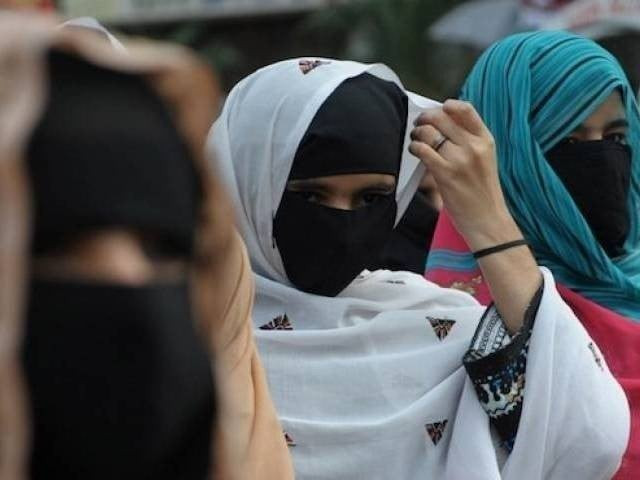Most women feel unsafe in public transport: research
Women say perpetrators of harassment in twin cities force them to wear burkas

Women say perpetrators of harassment in twin cities force them to wear burkas. PHOTO: FILE
This was revealed in a research titled “Gender spaces: Experiences of Women Commuters in Local Transport’. The report, conducted by Shirakat – a non-governmental organisation working on gender equality and social justice with funds from the European Union launched the report at a local hotel in Islamabad on Thursday.
Five men report harassment by women at workplace
The research points out that around half of the female commuters in the twin cities feel uncomfortable travelling via public transport, especially when men are around.
Women reported that men mostly stare at them. Around 60 per cent of respondents identified verbal jibes as the most common form of harassment they face Use of abusive language was also reported to be very common among men, they shared.
When asked if they feel their gender is the problem for men, unexpectedly 76.7 per cent of the respondents said that “being a woman was a problem for them [male passengers].”
A majority of the respondents, though, described their experience of travelling in public transport as ‘bad’, adding that that harassment was common in every public space with public transport an easy spot for targeting women since they are more accessible and in a confined space.
When asked about the source of discomfort on public transport, 63 per cent of the respondents said that they suffered most at the hands of male passengers.
The report also found a prevailing culture of silence among women on harassment, with 56.7 per cent of respondents saying they choose to remain silent in the face of harassment.
While quoting the experiences of some female commuters, the report said that most women reported men following them around, even after the woman has gotten off at their stop. Other harassments include comments being passed whilst inside the vans or buses which are loud enough to be heard by the victim.
Some respondents said some men throw small chits at girls with their cell numbers inscribed on them.
“Men do not respect women who travel with them in vans. They are of the mindset that the women must travel in private vehicles or those travelling with male members of her family are respectable women,” one of the respondents told researchers.
“With such thinking, male passengers’ do not respect women commuters and do whatever they want like touching them physically or saying something inappropriate.”
The behaviour of men seems to have pushed women on the defensive who resort to a number of methods to “protect themselves”.
“We use the burka forcefully because all the male passengers stare at us and if we do not do purdah0, they try to harass us more by constantly staring at us or passing sexually explicit comments and using abusive language,” most of the respondents said in the report.
SC concerned over rising women harassment cases
These tactics undertaken by men travelling by public transport undermine women‘s freedom of self-expression and can have negative consequences on their social life, the report adds.
The research adds that van or bus conductors do little to help women. In fact around a quarter of respondents or 23.3 per cent, of women commuters, feel uncomfortable because of conductors who try and sit close to women or make awkward gestures like sitting with their legs open, or open the buttons of their shirts.
Meanwhile, 13.3 per cent of respondents identified drivers as ‘problem creators’. They said that most drivers adjust their mirror for staring at women while others install additional mirrors so that they can stare at women sitting in different parts of their vehicle.
Published in The Express Tribune, October 20th, 2017.



















COMMENTS
Comments are moderated and generally will be posted if they are on-topic and not abusive.
For more information, please see our Comments FAQ